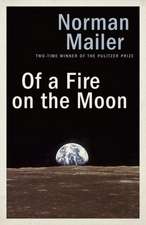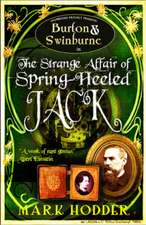The Castle in the Forest
Autor Norman Maileren Limba Engleză Paperback – 18 feb 2015
Praise for The Castle in the Forest
“This remarkable novel about the young Adolf Hitler, his family and their shifting circumstances, is Mailer’s most perfect apprehension of the absolutely alien. . . . Mailer doesn’t inhabit these historical figures so much as possess them.”—The New York Times Book Review
“Terrifically creepy . . . an icy and convincing portrait of the dictator as a young sociopath.”—Entertainment Weekly
“The work of a bold and confident writer who may yet be seen as the preeminent novelist of our time . . . a source of tremendous narrative pleasure . . . Every character . . . lives and breathes.”—South Florida Sun-Sentinel
“Blackly hilarious, beautifully written . . . [The Castle in the Forest] has vigor, excitement, humor and vastness of spirit.”—The New York Observer
Praise for Norman Mailer
“[Norman Mailer] loomed over American letters longer and larger than any other writer of his generation.”—The New York Times
“A writer of the greatest and most reckless talent.”—The New Yorker
“Mailer is indispensable, an American treasure.”—The Washington Post
“A devastatingly alive and original creative mind.”—Life
“Mailer is fierce, courageous, and reckless and nearly everything he writes has sections of headlong brilliance.”—The New York Review of Books
“The largest mind and imagination [in modern] American literature . . . Unlike just about every American writer since Henry James, Mailer has managed to grow and become richer in wisdom with each new book.”—Chicago Tribune
“Mailer is a master of his craft. His language carries you through the story like a leaf on a stream.”—The Cincinnati Post
From the Hardcover edition.
Preț: 80.67 lei
Preț vechi: 95.69 lei
-16% Nou
Puncte Express: 121
Preț estimativ în valută:
15.44€ • 16.06$ • 12.75£
15.44€ • 16.06$ • 12.75£
Carte disponibilă
Livrare economică 22-29 martie
Livrare express 11-15 martie pentru 40.13 lei
Preluare comenzi: 021 569.72.76
Specificații
ISBN-13: 9780812978490
ISBN-10: 0812978498
Pagini: 477
Dimensiuni: 132 x 206 x 28 mm
Greutate: 0.37 kg
Editura: Random House Trade
ISBN-10: 0812978498
Pagini: 477
Dimensiuni: 132 x 206 x 28 mm
Greutate: 0.37 kg
Editura: Random House Trade
Extras
1
You may call me D.T. That is short for Dieter, a German name, and D.T. will do, now that I am in America, this curious nation. If I draw upon reserves of patience, it is because time passes here without meaning for me, and that is a state to dispose one to rebellion. Can this be why I am writing a book? Among my former associates, we had to swear never to undertake such an action. I was, after all, a member of a matchless Intelligence group. Its classification was SS, Special Section IV-2a, and we were directly under the supervision of Heinrich Himmler. Today, the man is seen as a monster, and I would not look to defend him—he turned out to be one hell of a monster. All the same, Himmler did have an original mind, and one of his theses does take me into my literary intentions, which are, I promise, not routine.
2
The room that Himmler used when speaking to our elite group was a small lecture hall with dark walnut paneling and was limited to twenty seats raked upward in four rows of five. My emphasis will not be, however, on such descriptions. I prefer to concern myself with Himmler’s unorthodox concepts. They may even have stimulated me to begin a memoir that is bound to prove unsettling. I know that I will sail into a sea of turbulence, for I must uproot many a conventional belief. A cacophony erupts in my spirit at the thought. As Intelligence officers, we often seek to warp our findings. Mendacity, after all, possesses its own art, but this is a venture that will ask me to forsake such skills.
Enough! Let me present Heinrich Himmler. You, the reader, must be prepared for no easy occasion. This man, whose nickname, behind his back, was Heini, had become by 1938 one of the four truly important leaders in Germany. Yet his most cherished and secret intellectual pursuit was the study of incest. It dominated our highest-level research, and our findings were kept to closed conferences. Incest, Heini would propose, had always been rife among the poor of all lands. Even our German peasantry had been much afflicted, yes, even as late as the nineteenth century. “Normally, no one in learned circles cares to speak of the matter,” he would remark. “After all, there is nothing to be done. Who would bother to call some poor wretch a certified offspring of incest? No, every establishment of every civilized nation looks to sweep such stuff under the rug.”
That is, all ranking government officials in the world except for our Heinrich Himmler. He did have the most extraordinary ideas fermenting behind his unhappy spectacles. I must repeat that for a man with a bland and chinless mug, he certainly exhibited a frustrating mixture of brilliance and stupidity. For example, he declared himself to be a pagan. He predicted that there would be a healthy future for humankind once paganism took over the world. Everyone’s soul would then be enriched with hitherto unacceptable pleasures. None of us could conceive, however, of an orgy where carnality would rise to such a pitch that you might find a woman ready to throw herself into a flesh-melting roll with Heinrich Himmler. No, not even in the most innovative spirit! For you could always see his face as it must once have been at a school dance, that bespectacled disapproving stare of the wallflower, tall, thin, a youth full of physical ineptitude. Already he had a small potbelly. There he was, ready to wait by the wall while the dance went on.
Yet he grew obsessed over the years with matters others did not dare to mention aloud (which, I must say, is usually the first step to new thought). In fact, he paid close attention to mental retardation. Why? Because Himmler subscribed to the theory that the best human possibilities lie close to the worst. So he was ready to assume that promising children when found in low, nondescript families could be “incestuaries.” The word in German, as he coined it, was Inzestuarier. He did not like the more common term of such disgrace, Blutschande (blood-scandal), or as it is sometimes employed in polite circles, Dramatik des Blutes (blood-drama).
None of us felt sufficiently qualified to say that his theory could be dismissed. Even in the early years of the SS, Himmler had recognized that one of our prime needs was to develop exceptional research groups. We had a duty to search into ultimates. As Himmler put it, the health of National Socialism depended on nothing less than these letzte Fragen (last questions). We were to explore problems that other nations did not dare to go near. Incest was at the head of the list. The German mind had to re-establish itself again as the leading inspiration to the learned world. In turn—so went his unstated coupling—much recognition might be given to Heinrich Himmler for his profound attack on problems originating in the agricultural milieu. He would emphasize the underlying point: Husbandry could hardly be investigated without comprehending the peasant. Yet to understand this man of the earth was to speak of incest.
Here, I promise you, he would hold up his hand in precisely that little gesture Hitler used to employ—one prissy flip of the wrist. It was Heinrich’s way of saying: “Now comes the meat. And with it—the potatoes!” Off he would go on a peroration. “Yes,” he would say, “incest! This is one very good reason that old peasants are devout. An acute fear of the sinful is bound to display itself by one of two extremes: Absolute devotion to religious practice. Or nihilism. I can recall from my student days that the Marxist Friedrich Engels once wrote, ‘When the Catholic Church decided adultery was impossible to prevent, they made divorce impossible to obtain.’ A brilliant remark even if it comes from the wrong mouth. As much can be said for blood-scandal. That is also impossible to prevent. So, the peasant looks to keep himself devout.” He nodded. He nodded again as if two good pumps of his head might be the minimum necessary to convince us that he was speaking from both sides of his heart.
How often, he asked, could the average peasant of the last century avoid these blood temptations? After all, that was not so easy. Peasants, it had to be said, were not usually attractive people. Their features were worn away by hard labor. Besides, they reeked of the field and the barn. Personal odors were at the mercy of hot summers. Under such circumstances, would not basic impulses trigger forbidden inclinations? Given the paucity of their social life, how were they to acquire the ability to stay away from entanglements with brothers and sisters, fathers and daughters?
He did not go on to speak of the pell-mell of limbs and torsos formed by three or four children in a bed, nor the ham-handed naturalness of the most agreeable work of all—that hard-breathing, feverish meat-heavy run up the hills of physical joy—but he did declare, “More than a few in the agricultural sector come, willy-nilly, to see incest as an acceptable option. Who, after all, is most likely to find the honorable work-hardened features of the father or the brother particularly attractive? The sisters, of course! Or the daughters. Often they are the only ones. The father, having created them, remains the focus of their attention.”
Hand it to Himmler. He had been storing theories in his head for two decades. A great believer in Schopenhauer, he would also give prominence to a word still relatively new in 1938—genes. These genes, he said, were the biological embodiment of Schopenhauer’s concept of the Will. They are the basic element of this mysterious Will. “We know,” he said, “that instincts can be passed from one generation to the next. Why? I would say it is in the nature of the Will to remain true to its origins. I even speak of that as a Vision, yes, gentlemen, a force that lives at the core of our human existence. It is this Vision which separates us from the animals. From the beginning of our time on earth, we humans have been seeking to rise to the unseen heights that lie ahead.
“Of course, there are impediments to such a great goal. The most exceptional of our genes must still be able to surmount the privations, humiliations, and tragedies of life as the genes are transmitted from father to child, generation after generation. Great leaders, I would tell you, are rarely the product of one father and one mother. It is more likely that the rare leader is the one who has succeeded in breaking through the bonds that held back ten frustrated generations who could not express the Vision in their own lives but did pass it on through their genes.
“Needless to say, I have arrived at these concepts by meditat- ing upon the life of Adolf Hitler. His heroic rise resonates in our hearts. Since he issues, as we know, from a long line of modest peasant stock, his life demonstrates a superhuman achievement. Absolute awe must overwhelm us.”
As Intelligence agents, we were smiling within. This had been the peroration. Now our Heinrich was ready to enter what Americans call the nitty-gritty. “The real question to be asked,” he said, “is how does the brilliance of the Vision protect itself from being dulled by commingling? That is implicit in the process of so-called normal reproduction. Contemplate the multimillions of sperm. One of them has to travel all the way up to the ovum of the female. To each lonely sperm cell swimming in the uterine sea, that ovum will loom as large as a battle cruiser.” He paused before he nodded. “The same readiness for self-sacrifice that will carry men at war through an uphill attack on a forbidding ridge must exist in healthy sperm. The essence of the male seed is that it is ready to commit itself to just such immolation in order that one of them, at least, will reach the ovum!”
He stared at us. Could we share his excitement? “The next question,” he said, “soon arises. Will the genes of the woman be compatible with the sperm cell that has managed to reach her? Or will these separate elements find their respective genes to be in dispute? Are they about to act like unhappy husbands and wives? Yes, I would answer, dispute is often the prevailing case. The meeting may prove sufficiently compatible for procreation to occur, but the combination of their genes is hardly guaranteed to be in harmony.
“When we speak, therefore, of the human desire to create that man who will embody the Vision—the Superman—we have to consider the odds. Not even one in a million families can present us with a husband and a wife who are close enough in the inclination of their genes to bring forth a miraculous child. Not even one, perhaps, in a hundred million. No!”—again the upraised hand—“let us say, closer to a million million. In the case of Adolf Hitler, the numbers may approach the awesome distances we encounter in astronomy.
“So, gentlemen, logic would propose that any Superman who embodies the Vision, is bound to come forth from a mating of exceptionally similar genetic ingredients. Only then will these separate embodiments of the Vision be ready to reinforce each other.”
Who could not see what Heinrich was aiming at? Incest offered the nearest possibility for such unity of purpose.
“Yet,” said Himmler, “to be reasonable, we must also agree that life is not always ready to certify such an event. Debased males and females are the ones who usually come into the world from these family intimacies. We have to recognize that products of incest usually suffer childhood ills and early deaths. Anomalies abound, even exhibitions of physical monstrosity.”
He stood there, sad and stern. “That is the price. Not only are many reinforced good tendencies likely to be present in an inces- tuary, but unhappy inclinations can be magnified as well. Insta- bility is, therefore, a common product of incest. Idiocy waits in the wings. And when a vital possibility exists for the development of a great spirit, this rare human must still overcome a host of frus- trations profound enough to unhinge the brain or induce early death.” So spoke Heinrich Himmler.
I think all of us present knew the subtext of these remarks. Back in 1938, we were looking (in greatest secrecy, you may be certain) to determine whether our Führer was a first- or second-degree incestuary. Or neither. If not, if neither, then Himmler’s theory would remain groundless. But if our Führer was a true product of incest, then he was more than a glowing example of the likelihood of the thesis, he might be the proof itself.
From the Hardcover edition.
You may call me D.T. That is short for Dieter, a German name, and D.T. will do, now that I am in America, this curious nation. If I draw upon reserves of patience, it is because time passes here without meaning for me, and that is a state to dispose one to rebellion. Can this be why I am writing a book? Among my former associates, we had to swear never to undertake such an action. I was, after all, a member of a matchless Intelligence group. Its classification was SS, Special Section IV-2a, and we were directly under the supervision of Heinrich Himmler. Today, the man is seen as a monster, and I would not look to defend him—he turned out to be one hell of a monster. All the same, Himmler did have an original mind, and one of his theses does take me into my literary intentions, which are, I promise, not routine.
2
The room that Himmler used when speaking to our elite group was a small lecture hall with dark walnut paneling and was limited to twenty seats raked upward in four rows of five. My emphasis will not be, however, on such descriptions. I prefer to concern myself with Himmler’s unorthodox concepts. They may even have stimulated me to begin a memoir that is bound to prove unsettling. I know that I will sail into a sea of turbulence, for I must uproot many a conventional belief. A cacophony erupts in my spirit at the thought. As Intelligence officers, we often seek to warp our findings. Mendacity, after all, possesses its own art, but this is a venture that will ask me to forsake such skills.
Enough! Let me present Heinrich Himmler. You, the reader, must be prepared for no easy occasion. This man, whose nickname, behind his back, was Heini, had become by 1938 one of the four truly important leaders in Germany. Yet his most cherished and secret intellectual pursuit was the study of incest. It dominated our highest-level research, and our findings were kept to closed conferences. Incest, Heini would propose, had always been rife among the poor of all lands. Even our German peasantry had been much afflicted, yes, even as late as the nineteenth century. “Normally, no one in learned circles cares to speak of the matter,” he would remark. “After all, there is nothing to be done. Who would bother to call some poor wretch a certified offspring of incest? No, every establishment of every civilized nation looks to sweep such stuff under the rug.”
That is, all ranking government officials in the world except for our Heinrich Himmler. He did have the most extraordinary ideas fermenting behind his unhappy spectacles. I must repeat that for a man with a bland and chinless mug, he certainly exhibited a frustrating mixture of brilliance and stupidity. For example, he declared himself to be a pagan. He predicted that there would be a healthy future for humankind once paganism took over the world. Everyone’s soul would then be enriched with hitherto unacceptable pleasures. None of us could conceive, however, of an orgy where carnality would rise to such a pitch that you might find a woman ready to throw herself into a flesh-melting roll with Heinrich Himmler. No, not even in the most innovative spirit! For you could always see his face as it must once have been at a school dance, that bespectacled disapproving stare of the wallflower, tall, thin, a youth full of physical ineptitude. Already he had a small potbelly. There he was, ready to wait by the wall while the dance went on.
Yet he grew obsessed over the years with matters others did not dare to mention aloud (which, I must say, is usually the first step to new thought). In fact, he paid close attention to mental retardation. Why? Because Himmler subscribed to the theory that the best human possibilities lie close to the worst. So he was ready to assume that promising children when found in low, nondescript families could be “incestuaries.” The word in German, as he coined it, was Inzestuarier. He did not like the more common term of such disgrace, Blutschande (blood-scandal), or as it is sometimes employed in polite circles, Dramatik des Blutes (blood-drama).
None of us felt sufficiently qualified to say that his theory could be dismissed. Even in the early years of the SS, Himmler had recognized that one of our prime needs was to develop exceptional research groups. We had a duty to search into ultimates. As Himmler put it, the health of National Socialism depended on nothing less than these letzte Fragen (last questions). We were to explore problems that other nations did not dare to go near. Incest was at the head of the list. The German mind had to re-establish itself again as the leading inspiration to the learned world. In turn—so went his unstated coupling—much recognition might be given to Heinrich Himmler for his profound attack on problems originating in the agricultural milieu. He would emphasize the underlying point: Husbandry could hardly be investigated without comprehending the peasant. Yet to understand this man of the earth was to speak of incest.
Here, I promise you, he would hold up his hand in precisely that little gesture Hitler used to employ—one prissy flip of the wrist. It was Heinrich’s way of saying: “Now comes the meat. And with it—the potatoes!” Off he would go on a peroration. “Yes,” he would say, “incest! This is one very good reason that old peasants are devout. An acute fear of the sinful is bound to display itself by one of two extremes: Absolute devotion to religious practice. Or nihilism. I can recall from my student days that the Marxist Friedrich Engels once wrote, ‘When the Catholic Church decided adultery was impossible to prevent, they made divorce impossible to obtain.’ A brilliant remark even if it comes from the wrong mouth. As much can be said for blood-scandal. That is also impossible to prevent. So, the peasant looks to keep himself devout.” He nodded. He nodded again as if two good pumps of his head might be the minimum necessary to convince us that he was speaking from both sides of his heart.
How often, he asked, could the average peasant of the last century avoid these blood temptations? After all, that was not so easy. Peasants, it had to be said, were not usually attractive people. Their features were worn away by hard labor. Besides, they reeked of the field and the barn. Personal odors were at the mercy of hot summers. Under such circumstances, would not basic impulses trigger forbidden inclinations? Given the paucity of their social life, how were they to acquire the ability to stay away from entanglements with brothers and sisters, fathers and daughters?
He did not go on to speak of the pell-mell of limbs and torsos formed by three or four children in a bed, nor the ham-handed naturalness of the most agreeable work of all—that hard-breathing, feverish meat-heavy run up the hills of physical joy—but he did declare, “More than a few in the agricultural sector come, willy-nilly, to see incest as an acceptable option. Who, after all, is most likely to find the honorable work-hardened features of the father or the brother particularly attractive? The sisters, of course! Or the daughters. Often they are the only ones. The father, having created them, remains the focus of their attention.”
Hand it to Himmler. He had been storing theories in his head for two decades. A great believer in Schopenhauer, he would also give prominence to a word still relatively new in 1938—genes. These genes, he said, were the biological embodiment of Schopenhauer’s concept of the Will. They are the basic element of this mysterious Will. “We know,” he said, “that instincts can be passed from one generation to the next. Why? I would say it is in the nature of the Will to remain true to its origins. I even speak of that as a Vision, yes, gentlemen, a force that lives at the core of our human existence. It is this Vision which separates us from the animals. From the beginning of our time on earth, we humans have been seeking to rise to the unseen heights that lie ahead.
“Of course, there are impediments to such a great goal. The most exceptional of our genes must still be able to surmount the privations, humiliations, and tragedies of life as the genes are transmitted from father to child, generation after generation. Great leaders, I would tell you, are rarely the product of one father and one mother. It is more likely that the rare leader is the one who has succeeded in breaking through the bonds that held back ten frustrated generations who could not express the Vision in their own lives but did pass it on through their genes.
“Needless to say, I have arrived at these concepts by meditat- ing upon the life of Adolf Hitler. His heroic rise resonates in our hearts. Since he issues, as we know, from a long line of modest peasant stock, his life demonstrates a superhuman achievement. Absolute awe must overwhelm us.”
As Intelligence agents, we were smiling within. This had been the peroration. Now our Heinrich was ready to enter what Americans call the nitty-gritty. “The real question to be asked,” he said, “is how does the brilliance of the Vision protect itself from being dulled by commingling? That is implicit in the process of so-called normal reproduction. Contemplate the multimillions of sperm. One of them has to travel all the way up to the ovum of the female. To each lonely sperm cell swimming in the uterine sea, that ovum will loom as large as a battle cruiser.” He paused before he nodded. “The same readiness for self-sacrifice that will carry men at war through an uphill attack on a forbidding ridge must exist in healthy sperm. The essence of the male seed is that it is ready to commit itself to just such immolation in order that one of them, at least, will reach the ovum!”
He stared at us. Could we share his excitement? “The next question,” he said, “soon arises. Will the genes of the woman be compatible with the sperm cell that has managed to reach her? Or will these separate elements find their respective genes to be in dispute? Are they about to act like unhappy husbands and wives? Yes, I would answer, dispute is often the prevailing case. The meeting may prove sufficiently compatible for procreation to occur, but the combination of their genes is hardly guaranteed to be in harmony.
“When we speak, therefore, of the human desire to create that man who will embody the Vision—the Superman—we have to consider the odds. Not even one in a million families can present us with a husband and a wife who are close enough in the inclination of their genes to bring forth a miraculous child. Not even one, perhaps, in a hundred million. No!”—again the upraised hand—“let us say, closer to a million million. In the case of Adolf Hitler, the numbers may approach the awesome distances we encounter in astronomy.
“So, gentlemen, logic would propose that any Superman who embodies the Vision, is bound to come forth from a mating of exceptionally similar genetic ingredients. Only then will these separate embodiments of the Vision be ready to reinforce each other.”
Who could not see what Heinrich was aiming at? Incest offered the nearest possibility for such unity of purpose.
“Yet,” said Himmler, “to be reasonable, we must also agree that life is not always ready to certify such an event. Debased males and females are the ones who usually come into the world from these family intimacies. We have to recognize that products of incest usually suffer childhood ills and early deaths. Anomalies abound, even exhibitions of physical monstrosity.”
He stood there, sad and stern. “That is the price. Not only are many reinforced good tendencies likely to be present in an inces- tuary, but unhappy inclinations can be magnified as well. Insta- bility is, therefore, a common product of incest. Idiocy waits in the wings. And when a vital possibility exists for the development of a great spirit, this rare human must still overcome a host of frus- trations profound enough to unhinge the brain or induce early death.” So spoke Heinrich Himmler.
I think all of us present knew the subtext of these remarks. Back in 1938, we were looking (in greatest secrecy, you may be certain) to determine whether our Führer was a first- or second-degree incestuary. Or neither. If not, if neither, then Himmler’s theory would remain groundless. But if our Führer was a true product of incest, then he was more than a glowing example of the likelihood of the thesis, he might be the proof itself.
From the Hardcover edition.
Notă biografică
Born in 1923 in Long Branch, New Jersey, and raised in Brooklyn, New York, Norman Mailer was one of the most influential writers of the second half of the twentieth century and a leading public intellectual for nearly sixty years. He is the author of more than thirty books. The Castle in the Forest, his last novel, was his eleventh New York Times bestseller. His first novel, The Naked and the Dead, has never gone out of print. His 1968 nonfiction narrative, The Armies of the Night, won the Pulitzer Prize and the National Book Award. He won a second Pulitzer for The Executioner’s Song and is the only person to have won Pulitzers in both fiction and nonfiction. Five of his books were nominated for National Book Awards, and he won a lifetime achievement award from the National Book Foundation in 2005. Mr. Mailer died in 2007 in New York City.
From the Hardcover edition.
From the Hardcover edition.
Recenzii
Praise for The Castle in the Forest
“This remarkable novel about the young Adolf Hitler, his family and their shifting circumstances, is Mailer’s most perfect apprehension of the absolutely alien. . . . Mailer doesn’t inhabit these historical figures so much as possess them.”—The New York Times Book Review
“Terrifically creepy . . . an icy and convincing portrait of the dictator as a young sociopath.”—Entertainment Weekly
“The work of a bold and confident writer who may yet be seen as the preeminent novelist of our time . . . a source of tremendous narrative pleasure . . . Every character . . . lives and breathes.”—South Florida Sun-Sentinel
“Blackly hilarious, beautifully written . . . [The Castle in the Forest] has vigor, excitement, humor and vastness of spirit.”—The New York Observer
Praise for Norman Mailer
“[Norman Mailer] loomed over American letters longer and larger than any other writer of his generation.”—The New York Times
“A writer of the greatest and most reckless talent.”—The New Yorker
“Mailer is indispensable, an American treasure.”—The Washington Post
“A devastatingly alive and original creative mind.”—Life
“Mailer is fierce, courageous, and reckless and nearly everything he writes has sections of headlong brilliance.”—The New York Review of Books
“The largest mind and imagination [in modern] American literature . . . Unlike just about every American writer since Henry James, Mailer has managed to grow and become richer in wisdom with each new book.”—Chicago Tribune
“Mailer is a master of his craft. His language carries you through the story like a leaf on a stream.”—The Cincinnati Post
“This remarkable novel about the young Adolf Hitler, his family and their shifting circumstances, is Mailer’s most perfect apprehension of the absolutely alien. . . . Mailer doesn’t inhabit these historical figures so much as possess them.”—The New York Times Book Review
“Terrifically creepy . . . an icy and convincing portrait of the dictator as a young sociopath.”—Entertainment Weekly
“The work of a bold and confident writer who may yet be seen as the preeminent novelist of our time . . . a source of tremendous narrative pleasure . . . Every character . . . lives and breathes.”—South Florida Sun-Sentinel
“Blackly hilarious, beautifully written . . . [The Castle in the Forest] has vigor, excitement, humor and vastness of spirit.”—The New York Observer
Praise for Norman Mailer
“[Norman Mailer] loomed over American letters longer and larger than any other writer of his generation.”—The New York Times
“A writer of the greatest and most reckless talent.”—The New Yorker
“Mailer is indispensable, an American treasure.”—The Washington Post
“A devastatingly alive and original creative mind.”—Life
“Mailer is fierce, courageous, and reckless and nearly everything he writes has sections of headlong brilliance.”—The New York Review of Books
“The largest mind and imagination [in modern] American literature . . . Unlike just about every American writer since Henry James, Mailer has managed to grow and become richer in wisdom with each new book.”—Chicago Tribune
“Mailer is a master of his craft. His language carries you through the story like a leaf on a stream.”—The Cincinnati Post
Descriere
Mailers first major work of fiction in more than a decade, and a work of stunning originality, explores the evil of Adolf Hitler. A tapestry of unforgettable characters, this work delivers its playful twists and surprises with astonishing insight into the nature of the struggle between good and evil that exists in everyone.




















